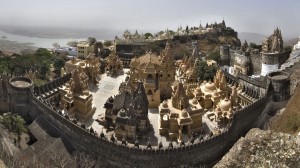History
The word “India” is derived from the river Indus. The first evidence of human settlement in the Indian sub-continent dates back to 6000 BCE. These settlements expanded around 3000 BCE. The Indus valley civilization flourished till the coming of the Aryans. Indus valley civilization was highly urbanized, based on agriculture and commerce.
Social, economic and political changes that happened after the civilizations of Indus and Aryans are depicted in the two great epics of India, the Ramayana and the Mahabharata. The old Vedic culture gave way to the pragmatism of the Upanishads, and this in turn stimulated the rise of reformers like Vardhaman Mahavira and Gautama Buddha around the 5th century BCE, who offered Hinduism new teachings from which arise two religions of Jainism and Buddhism.
The empires mentioned in the Epics were centered around today’s Delhi, but as the Aryans colonized more of the sub-continent, the centre of power shifted and the capitals of the great dynastic empires of ancient India were in the area today covered by the state of Bihar. These dynasties included the Nandas (3rd century BCE) who stopped Alexander the Great from entering the Gangetic plain (326 to 325 BCE), the Mauryas (2nd to 1st century BCE) whose zenith was the empire of Ashoka, and the Guptas (4th century CE) in whose time Kautilya wrote the famous Arthashastra, or Treatise on Government. The last great empire in this period of Indian history was that of Harsha in the 7th century CE.
The Turks and the Mongols penetrated into India from the North in waves beginning in the 11th century, which ultimately culminated in the establishment of the Mughal Empire (1526 to 1857); The Portuguese (Vasco de Gama landed at Calicut (Kozhikode) in 1498; the Dutch, the French and the British discovered the sea routes which allowed them to enter India from the sea, initially as traders and later as colonizers.
The British compete with French (the first Anglo-French war was fought in 1748) for inexhaustible natural wealths of India. The British exploited India till 1947, when people fighting for India’s independence achieved freedom with their leader Mahatma Gandhi who formulated the path of non-violent resistance.

